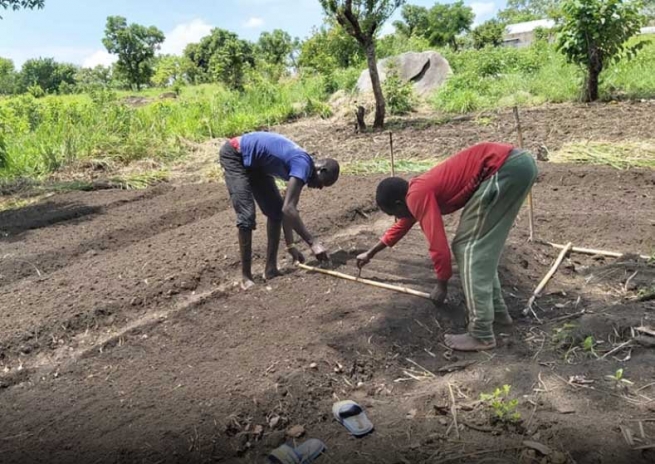This is the situation of over 55,000 refugees residing in the Palabek settlement in northern Uganda. The Salesians, with five missionaries, are the only institution that lives with them within the camp. If the coronavirus were to reach the settlement it would be a catastrophe, as there are no medical means to cure it. For this reason, from the outset, lockdown was decreed with meetings banned and food distribution reorganized.
While economists and global analysts predict that millions of people will lose their jobs and other security in this crisis, refugees are already suffering from the pandemic's consequences. Last April, for example, they received only 70% of their already meager monthly regular food ration per person: 9 kg of corn flour, 6 kg of beans, about half a liter of oil, and a few grams of salt.
Before this situation, in which the majority of the settlement's children suffer from malnutrition, and their mothers from stress and anxiety, the Salesians intervened. The solution is to grow foods like cereals, vegetables, sunflower seeds. "This is the time to be very creative and innovative with the refugees in the field of agriculture. We have prepared vegetable gardens and orchards. We have rented land from the Ugandans. We are starting to breed poultry, pigs and goats," explain the missionaries.
As the rains continue, the real need for refugees is of seeds and simple manual farm tools.
As the refugees have only 30 square meters for use as a home, with a small garden attached, the Salesians organized them into groups and rented land for them from the Ugandan neighbors. When necessary, they also plowed the land for them.
At the same time, since the technical and vocational school is closed, a group of refugees has learned to sew masks: a service that allows them to receive a small income to help their families and that contributes to the community's safety. In the first two weeks of activity alone, 1,500 refuge masks were made.
The Salesians in Palabek are grateful for the help received from Salesian circles around the world, but now they are asking for support to be able to purchase seeds and tools to continue helping refugees.
Source: Misiones Salesianas

